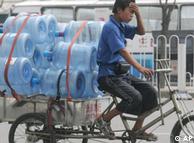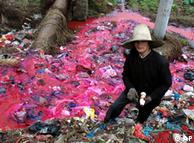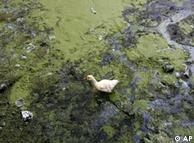
中 國環境保護部副部長張力軍在一個新聞發佈會上說﹐從普查數據和以往統計數據的懸殊差異可以看出﹐第一次全國污染源普查在調查方面更精確了﹐首次將農業源水 污染物包括在內﹐農業源污水中含有大量氨等化學物質。這些化學物質來自化肥和農藥﹐後者雖然使農業耕作發生了革命性變革﹐但卻被千百萬農民不當使用﹐這些 農民通常都在零散的小片土地上耕作。
新的統計數據凸顯出中國急需進行河道清理﹐因為它們吸納更多污染物的能力正在縮減。中國估計﹐其水體具備每年自然淨化污染物約700萬噸的能力。
不 過﹐中國非營利環保組織公眾與環境研究中心的負責人馬軍認為﹐這份普查報告朝承認問題邁出了重要的第一步﹐接下來就能夠採取行動了。公眾與環境研究中心使 用各種已公開發表的報告匯編了一個顯示全國空氣和水污染情況的數據庫。馬軍說﹐他認為普查數據的公佈非常具有積極意義。
環 保人士說﹐由於地方官員不願採用更嚴格的環保標準﹐這一普查報告在引發環保變革方面的效力可能是有限的。中國主要依據經濟增長情況來對地方官員進行績效評 估﹐而提高環保標準有可能限制工業增長。環保部副部長張力軍說﹐在對政府官員的政績進行年度評估時﹐將不會考慮這份普查報告的結果。這次普查是中國動用約 50萬人歷時數年完成的。
週二公佈的普查數據還顯示﹐中國的工業廢物製造量比以往報告所顯示的要高很多﹐這些工業廢物還包括有害物質。中 國環保部說﹐2007年來自礦山和鋼鐵廠的工業固體廢物總量為4,914萬噸﹐比此前報告的2007年這一數字高出兩倍多。環保部未對這一數值差作出解 釋。在中國﹐污染和其他環境問題除引發人們對健康問題的擔憂外﹐已經成了一個導致社會不穩的主要誘因。
Shai Oster
廣西鎘汙染_威脅到柳州水源 中時電子報
公開及時 柳州應對龍江河鎘污染事件信息發布獲好評 新華網廣西頻道
2010年02月10日09:54 China Sees Vast Pollution
China's government said its water is far more polluted and its industry is producing far more waste than previously realized, in a major study that environmentalists welcomed as a step toward greater transparency.
China's first official nationwide census of pollution sources, issued Tuesday, found that the amount of pollution discharged into the water totaled 30.3 million metric tons in 2007 -- more than double the 13.8 million tons reported for that year in a 2008 report, where the government said water pollution had declined 3% from 2006.
At a news conference, Zhang Lijun, vice minister for environment protection, said the huge increase reflected the census's more accurate measurements that for the first time included wastewater runoff from farms that is laden with chemicals such as ammonia. The chemicals are in fertilizers and pesticides that have revolutionized food cultivation but are misused by millions of farmers who typically work on fragmented plots of land.
The new numbers underscore the urgent need for China to clean up its waterways, because of their shrinking capacity to absorb more pollution. China estimates its water has the natural ability to safely absorb about seven million tons a year of pollution discharge.
Still, the report represents 'an important first step to recognize the problem. Then you can take action,' said environmentalist Ma Jun, head of the Institute of Public and Environmental Affairs, a nonprofit organization that has compiled a database of nationwide air and water pollution using public records. 'I think this is highly positive for this data to be disclosed.'
Environmentalists said the survey's effectiveness in sparking change may be limited by reluctance among local officials, who are mostly judged on economic performance, to employ tougher standards that might limit industrial growth. Mr. Zhang, the vice minister, said the results of the census, which involved years of effort and about half a million workers, won't be considered in annual performance reviews of government bureaucrats.
Tuesday's data also indicated that China is producing far more industrial waste, including hazardous material, than previously reported. The ministry said industrial solid waste such as particles from mines or steel mills totaled 49.14 million tons in 2007 -- more than triple earlier figures for the year. The ministry didn't give an explanation for the discrepancy.
Pollution and other environmental issues have become a leading cause of social unrest in China, in addition to spurring health concerns.
***
Environment | 26.01.2012
Tainted river sparks bottled water craze in China
Residents in China's southern city Liuzhou scrambled for bottled water after authorities found excessive quantities of cadmium in the Longjiang River. The toxicity levels are as much as three times higher than the government’s accepted level, state media said Thursday.
"The contamination was first detected on January 15 near a dam on the Longjiang River after dead fish had been found," water expert Ma Jun said, blaming authorities for not releasing the news of the contamination early enough.
Waste containing a large amount of cadmium had been discharged into the river by the mining company Jinhe, said Ma. Authorities took immediate measures by dumping special chemicals into the water to neutralize it.
 People are stocking up on drinking water
People are stocking up on drinking water
Gu Jidong, professor of Environmental Science with the University of Hong Kong, told Deutsche Welle it is not something new that agricultural products are tainted by cadmium, as there is a large amount of cadmium in the environment. "It happened in Japan before, where rice contained cadmium exceeding the safety limit," said Gu, adding that agricultural products were more likely to be contaminated than water.
Cadmium has traditionally been used in the electronics industry. Old-fashioned batteries contain this element or mercury. Cadmium is carcinogenic and can seriously cause damage to kidneys, bones and respiratory system, according to information from the World Health Organization.
According to Gu, the lack of accountability and the lack knowledge are the two main factors leading to frequent pollution. "First, it concerns the ownership of land. The land belongs to the country. So people might think they shouldn’t be responsible for the land because it is not theirs. And the local governments tend to give economic benefits a higher priority than environmental protection," said Gu. Furthermore, "most people are unaware how serious the environmental pollution is, especially farmers and villagers." Gu suggested that the media should cover more issues concerning the environment to raise public awareness.
 Waste is disposed in an improper manner
Waste is disposed in an improper manner
Public scare
Shelves carrying bottled water were almost vacated in one supermarket, as a picture of Xinhua news agency showed. Chinese state media also said authorities had dispatched officials to ensure there was an abundant supply of bottled water.
"Water pollution is rife, from city to village, from tributary to river," said Ma, pointing out that over 100 million rural dwellers are still drinking water below standard and around one in five water reserves in cities are not up to standard, "except in big cities like Beijing, where water reserves are under strict control."
Gu is not optimistic about the future of water pollution. "I think in the years to come, the environment will continue to deteriorate." Although this is not a problem which can be solved overnight, what the government can at least do, according to Gu, is to keep the public well-informed and educate on the importance of purifying water by means of filtering or boiling.
Author: Miriam Wong
Editor: Sarah Berning

沒有留言:
張貼留言